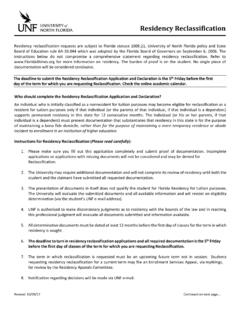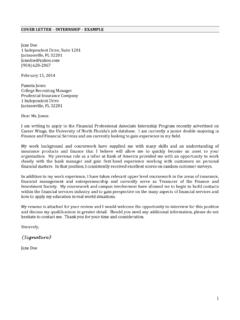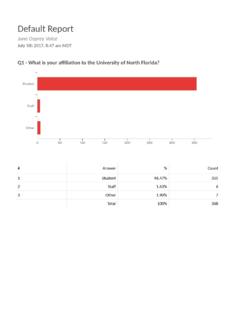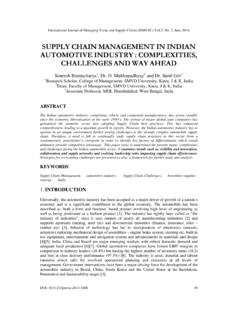Transcription of Exploring the relationship between marketing and …
1 Exploring the relationship between marketing and supplychain management : introduction to the special issueJohn T. Mentzer&Greg GundlachReceived: 8 May 2009 /Accepted: 13 May 2009#Academy of marketing Science 2009 AbstractSupply chains and supply chain management areimportant areas of business practice and scholarship thatoverlap with the discipline and practice of marketing andmarketing management . The co-editors of the Journal sSpecial Issue Exploring the relationship between Marketingand supply chain management provide an introduction tothe special issue, overview its contents and extend theirappreciation to the authors, reviewers, editor and staff whosecontributions and efforts made it chain issue introductionIntroductionSupply chains and supply chain management (SCM) haveemerged as increasingly important areas of businesspractice and academic scholarship. Originally recognizedin the 1980s, SCM has attracted growing interest andattention on the part of both academics and conceptions of SCM detail its expanding role withinorganizations to encompass activities associated with theintegration of supply and demand management within andacross companies, including coordination and collaborationwith channel partners and customers, sourcing, procure-ment, conversion, and logistics.
2 As recently defined by theCouncil of supply chain management Professionals: supply chain management encompasses the planningand management of all activities involved in sourcingand procurement, conversion, and all Logistics Man-agement activities. Importantly, it also includescoordination and collaboration with channel partners,which can be suppliers, intermediaries, third-partyservice providers, and customers. In essence, SupplyChain management integrates supply and demandmanagement within and across developed, practiced and examined over time, supplychains and SCM include many phenomena and practicescommon to the discipline and practice of marketing andmarketing management . Developments in marketing schol-arship have increasingly recognized these commonalitiesand benefited from their presence. For example, marketingscholarship has gained from the knowledge that is obtainedthrough consideration of an expanded unit of analysis thatdefines supply chains as well as the managerial goal andprinciples of integration that are at the core of SCM.
3 At thesame time, scholarship in SCM has benefited from theconsiderable knowledge that has developed within market-ing concerning, for example, interfirm and interpersonalcoordination and collaboration including that which hasbeen obtained through the study of interorganizationalrelationships. Other benefits and influences may also these developments and benefits, the nature andimplications of the interrelationships of marketing andSCM have not been explored at great length in themarketing literature. In recognition of the importance ofsupply chains, the emergence of SCM as an interdisciplin-ary field, and the important association of each withJ. of the Acad. Mark. T. MentzerUniversity of Tennessee,Knoxville, TN, USAe-mail: Gundlach (*)University of North Florida,Jacksonville, FL, USAe-mail: and marketing management , this Special Issue oftheJournal of the Academy of marketing Sciencecontainsinterdisciplinary contributions that explore the relationshipbetween marketing and of the special issueEach of the eight articles in the special issue contributes toour understanding of the relationship between marketingand supply chain management .
4 The articles were selectedfrom 66 submissions based upon an extensive editorialreview process. We are grateful to the many individuals inthe fields of marketing and supply chain management andrelated disciplines who provided expertise and input duringthe editorial process. We are also grateful to Editor DavidStewart and the Editorial Review Board and the editorialstaff of theJournal of the Academy of marketing Sciencefor their support in publishing the special issue. The contentof the special issue is briefly overviewed developmentsAs reflected in their definitions and other conceptualdevelopments, the disciplines of both marketing and SCMhave evolved over time. Three manuscripts in the specialissue describe conceptual developments in and across thedisciplines thereby advancing understanding of the interre-lationship of marketing and SCM. As defined by theCouncil of supply chain management Professionals afoundational goal of SCM is the integration of supply ( ,logistics and operations) and demand ( , marketing ) management within and across companies.
5 Historically,companies have more often invested to create differentialadvantages in one but not both of these domains, oftenresulting in their sub-optimal integration. In their article,addressing this strategic imperative, Esper et al. (2010)introduce a conceptual framework for overcoming thischallenge. Focusing on the creation of customer valuethrough implementation of knowledge management pro-cesses between firms they describe how successful integra-tion may be achieved through the shared generation,dissemination, interpretation and application of real-timecustomer demand together with supply capacity framework provides guidance to scholars and practi-tioners interested in examining and applying these processesto achieve enhanced integration of supply and both marketing and SCM, thought pertaining tosupply chains has steadily evolved from a narrow focuson tangible goods and their movement for the purposes ofmanufacturing to broadened consideration of (1) the natureof goods offered in the marketplace, and (2) the scope ofmanagerial architectures within and between firms fordoing so.
6 In marketing , this evolution has recently beencaptured most prominently through scholarship associatedwith the service-dominant (S-D) logic of on this work, Lusch, Vargo and Tanniru (2010)apply S-D thinking in an effort to move marketing andSCM further in this direction. They explain how emphasison a firm s resources and competencies facilitates under-standing how the goods it produces may be betterunderstood as the tools or provisioning mechanisms forserving customers. Together with consideration of itsposition, role and relationship within others in the larger value networks through which these offerings areprovided to customers can advance both knowledge andpractice in marketing and broadening consideration of thought within market-ing and SCM has led to expansion of the breadth and scopeof the disciplines over time. This expansion has been acritical source for SCM s advancement but also led to someconfusion. On the one hand it has enabled SCM to betteraddress its integration goals, but on the other it has createdchallenges for its understanding and development.
7 It hasalso resulted in perceived redundancies with other disci-plines in some areas. In an effort to facilitate betterunderstanding of the field, to clarify its development andto identify opportunities for future research, in their articleStock, Boyer and Harmon (2010) trace and qualitativelyanalyze 166 unique definitions of SCM that have emergedsince SCM s introduction in the 1980 s. They identify andelaborate on the major themes that have emerged over timeto define SCM. In so doing they identify key researchquestions and issues pertaining to supply chains and SCMthat would benefit from research including work bymarketing technologyThe application of information technology to improveproductivity is the focus of considerable scholarshipongoing in both marketing and SCM. However, the linkbetween investment in IT and performance has not beenfirmly established in the literature, leading to what somehave labeled the Information Technology productivity paradox. To account for this paradox, theoretical explan-ations that emphasize the mediating and moderating role ofother variables between IT and performance have beenadvanced in the literature.
8 Three articles in the special issuedescribe empirical studies of these variables and their rolewithin supply chains. In their article, extending explan-ations that emphasize the strategic fit of resources and theenvironment, Davis-Sramek, Germain and Iyer (2010) positand empirically investigate the role of environmentalunpredictability on the implications of two forms of supplyJ. of the Acad. Mark. IT for two levels of firm performance. Drawing onthe resource-advantage theory of competition, Davis andGolicic (2010) develop and test a model that proposesmarket-oriented IT competence as a mediator of the effectsof IT infrastructure on marketing information flow, whichin turn yields comparative advantages in supply chainrelationships. Finally, Richey, Tokman and Dalela (2010)empirically examine various interactions involving the useof collaborative supply chain technologies and othervariables including relationship quality, resource comple-mentarity, and retailer logistics service on financial perfor-mance and ultimately on the overall performance in thepartnership.
9 In each case, findings from the studies add toour understanding of the intervening effects of selectvariables on the link between IT and firm performanceBeyond insights for understanding the role and impact ofinformation technology on supply chain performance, othervariables are important to a firm s performance within asupply chain . Two articles in the special issue empiricallyexamine additional variables of interest to marketing andSCM. Focusing on dependence, Scheer, Miao and Garrett(2010) examine whether the impact of suppliers capabil-ities in terms of their core offering, communication andoperations on various dimensions of customer loyalty aremediated by the customers benefit and cost-based depen-dence. Their mixed findings suggest that adoption of a bi-dimensional model of dependence focusing on its benefitsand costs may more fully capture the theoretical domain ofdependence, thereby permitting researchers to better exam-ine its role in supply chains and component et al. (2010) investigate the effects on a product smarket share of different variables under the control of thesupplier ( , case pack quantity), the retailer ( , shelf-facings) and variables controlled jointly by the supplier andretailer ( , price and shelf replenishment frequency).
10 Their findings suggest that retailers and suppliers mustwork to integrate marketing activities and supply chainprocesses both within and across firms to most effectivelyserve consumers and enhance their intent in this special issue was to explore the state ofthe theory and practice in the places where marketing andSCM touch. Where do they interact? Where do they not?Are there gaps in the necessary interactions? And, finally,what theories can be brought to bear to better answer thesequestions? Contributors explored these questions from theperspective of the imperative for companies that properlyintegrate demand and supply to understand this flow fromdemand to supply and back to demand from a servicedominant logic, to explore the drive for a commondefinition of SCM that encompasses all of its many facets,to incorporate technology into the marketing -SCM interac-tion, and to assess the impact of all these on firmperformance. From these endeavors we can move towarda more enhanced understanding of the fields of marketingand good research endeavor generates more questionsthan it answers, and we hope this special issue is noexception.














